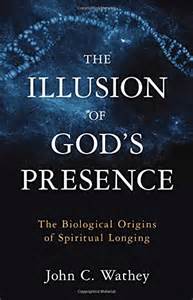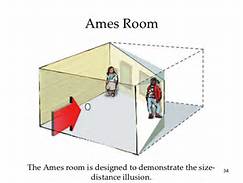
John C. Wathey’s clearly written and interesting book, The Illusion of God’s Presence is certainly worth the read for a good exposition on the intersection of science and belief: 320 pages of text in 15 chapters, with over 800 references. Although I disagree with his main premise and conclusions, his analysis is well presented and definitely worth the time to read. It contains a wealth of well-presented psychological and biological information and ends with an excellent overview of non-belief and secular humanism.
Interviewed on Seth Andrews’ Thinking Atheist podcast Wathey discusses a number of points from his book. Wathey explains that in high school, science and religion started to clash for him and the religious worldview did not seem to jive with reality anymore. I agree 100% that science and religion clash at a number of levels. On that point I think Wathey is spot on. Scientific findings do not support virgin birth, an earth centered universe, the Flood, Adam and Eve, humans ever living 100’s of years, variance in sexual orientation being an abomination and deserving death, the existence of a soul or after life, reincarnation, nirvana, etc., etc. As Wathey says, religion and science are two completely different ways of looking at the world. I couldn’t agree more.
However, I disagree completely with his characterization that the occasional and not at all universal experience of god’s presence is an illusion (rather than a delusion) and that this “illusion” explains much of religion’s appeal: the “real reason” people believe as he claims up front in the preface to the book.
An illusion is part and parcel to our innate perceptual interpretation system. It is universal and all humans experience them, they are inescapable. Not all humans however, fall sway to the god delusion, as Richard Dawkins correctly termed it in the title of his famous book. Wathey purposely contrasts his title to Dawkin’s, describing the feeling of the presence of god as an illusion, which I will argue is an obvious mistake.
I note also that many of us raised in a faith, whether lightly encouraged and not at all coerced, or fully compelled to believe and smothered within the Xian cocoon as so many have experienced, can readily walk away from such indoctrination, including the fleeting feeling (if one ever experiences it) of god’s presence. It does not seem at all to be a biological imperative along the lines of chick imprinting, an analogy Wathey draws from the study of ethology, or to be an unconscious urge left over from our infancy for a Freudian-like “mother model” as he also maintains. There is a huge literature within developmental psychology on the very real phenomenon of infant-mother attachment, which is not at all necessarily interpreted in terms of a post-Freudian mother model as Wathey discusses. Wathey covers a lot of ground, deftly explaining the literature from cognitive and developmental psychology, psychology of religion, and of course neuroscience. Again as a well written exposition of a wealth of scientific information from a lot of different fields, it is an excellent book. I take exception to his main premise and his reasoning that all this science somehow explains religion mainly due to the feeling of the presence of some god.
Wathey feels this innate vague sense of the existence of a mother being that is built in to us as human infants can be triggered in adults to create the illusion of feeling a specific presence of a god-like caregiver. Oddly enough in the major religions it is not a mother figure of course that we are told exists, but a stern, law-giving father figure, who will burn us in his hell if we don’t worship him, and in the just right manner,…something no mother would do. I think his analogy is a bit of stretch for a number of reasons.
Many of us never experience any sort of transcendence or immanence of god immediately around us: out there somewhere, watching over us. For many of us it is a fantasy we never buy into, not at all an illusion one cannot escape due to it being hardwired in as with a visual illusion we cannot avoid. A good number of humans never experience life changing mystical experiences, or ever yearn for one. Even the highly devout, such as the recently sainted Mother Theresa, complained in her personal letters that the feeling of god’s presence was not at all immanent, in fact wholly missing from her life. When she prayed fervently to Jesus, she complained in obvious distress that she knew there was no-one there. So even with full immersion into religious thinking that tells one they should readily and definitely feel god’s presence, there is no guarantee one will ever experience what Wathey claims is a biologically predisposed illusion. Mother Theresa’s plaint is not unusual, in fact it is often the fact that people see through the delusion (not an illusion, as Wathey claims) that one should feel some god to be present, and it becomes a significant factor in dropping their religion altogether. Stories like this are abundant in the non-belief literature. Seth Andrews’ own book Deconverted is but one of so many examples. Wathey cites a 1999 survey published by Michael Shermer where when asked why people believe in god, only 20.6% answered “experience of God in everyday life.” I dont think it is the “real reason” people believe at all. It may be one of the factors that increase religion’s appeal, and we may have a vague psychological disposition for transcendence, but it is not as pertinent as this book would have it.
Furthermore, I contend that without direct religious indoctrination or exposure to our cultural assumptions of a religious nature that “there must be something, somebody out there” most people will not undergo a feeling of god’s presence. It is a delusion that must be taught, not an unchangeable biologically oriented illusion.
Wathey’s own sense of god, or the personal experiences of the noted Evangelical Christian and prominent scientist Francis Collins, who claims to have experienced the Trinity in a waterfall, are the exception rather than the rule. And one easily outgrows them as Wathey and so many others have reported.
Additionally, not all religions promote the idea of a god’s presence. Buddhism does not contain the idea of a protecting watchful god-like figure, as in Wathey’s model of a mother-like presence. Their idea of transcendence is a “oneness with the universe” not the idea of some caregiver god watching over us all. So making the claim that the reason religions are around is that we feel this need for god’s presence does not apply to all religions as well. Wathey I feel, is projecting his personal experience of god’s immanence, which he was taught was correct and true by his Christianity infused culture, to apply to all humans, or to all religions when it doesn’t. It may be that most humans never feel that experience, even if instructed to, and tellingly never wish for it, if it was not part of their religious upbringing.
Not an Illusion
Definition of illusion:
From the wiki: “An illusion is a distortion of the senses, revealing how the brain normally organizes and interprets sensory stimulation. Though illusions distort reality, they are generally shared by most people.”
Definition of delusion:
From the wiki: “A delusion is a belief that is held with strong conviction despite superior evidence to the contrary. As a pathology, it is distinct from a belief based on false or incomplete information, confabulation, dogma, illusion, or other effects of perception.”
All humans with an intact visual system fall prey to the perceptual illusion of the Ames room. Wathey claims that the sense of god’s presence is an illusion similar to the cognitively impenetrable Ames Room visual illusion, where one sees people appear to be larger than they are due to the distorted dimensions of the room that one cannot detect from just the right camera angle:


The Ames room and other visual or auditory perceptual illusions, are cognitively impenetrable as Wathey correctly points out in his discussion with Seth Andrews.

Even when one knows that what they are looking at is impossible in reality, one experiences it regardless of that knowledge, such as the continually ascending staircase in the famous MC Escher print shown above. This is cognitive impenetrability. Knowing about an illusion, and that it is merely an illusion does not change the experience. Visual and other perceptual illusions are truly cognitively impenetrable. They are part and parcel of our perceptual system’s processing of information. We can’t ignore them or make them go away. Furthermore, all humans experience them as they are hard-wired into our brains. They are universal.
As a college psychology instructor I demonstrate the Ames Illusion to 3-4 Intro to Psych classes every semester. I’ve seen that damn video 100 times or more now over the years, and even though I know the room is totally distorted I still perceive the person growing from normal height to towering as they walk from one corner of the room to the other. No matter how many times I have seen it, and how well I understand it, my brain processes it the same way, as does every other human’s brain that views it.
Not so with the feeling of god’s presence. Not all humans, even those deeply immersed in religious culture experience that feeling. And the experience of god’s presence, wholly unlike a perceptual illusion is cognitively penetrable, as in Wathey’s own case. He came to realize as so many of the religious do, that the feeling of god’s presence is something they were instructed to have, that does go away when one thinks about it. So many realize they were only talking to themselves, not to god, or felt something that was never there. The feeling of god’s presence is not a hardwired, unavoidable experience at all.
The illusion of god’s presence is cognitively penetrable then, (it is a delusion). The Ames Room and other cognitively impenetrable illusions (such as the appearance of a huge full moon on the horizon) persist even after understanding they are not real. The “God Delusion” as Dawkins correctly termed it, can be discarded, or for so many is never succumbed to regardless of formidable and coercive religious upbringing. In addition, when children are raised secular without any religion, they don’t look to fill any god-shaped hole in their heart, not yearning for some transcendent caregiver. That idea, that delusion has to be taught, and it doesn’t always take.


Not everyone, even if taught to, believes in or feels the presence of the watchful god. Similarly, unless taught, no one buys into the delusion of “the power of prayer” or falls sway to the false belief of ancestor worship, wherein the feeling of presence is not a god, but instead your dead ancestors immanent in your life, and out there watching over you. This has to be ingrained for anyone to buy it, and the feeling of not god, but your grandma being in the room with you or at least up in heaven watching over you is a delusion as well, not an illusion.
Wathey also proposes the idea of human agency detection to be another factor in making us susceptible to the delusion of god’s presence. As toddlers develop their cognition and conceptual abilities they tend to see “agents” that aren’t there, in the shadows of a dark room or under their bed. Early mythology and religion are rife with the idea that there are unseen gods, ones who are causal agents, of the wind, the thunder, earthquakes, etc. Adults outgrow the tendency to assume unseen entities lurking about, and modern religions, mainly through the explanations of science, have discarded the many gods of classical mythology who made the wind blow and the clouds part. Wathey offers the well-known explanation from evolutionary psychology that this predisposition for agency attribution evolved in humans as a defense against predators. In our evolutionary environment it was good to assume its not just the wind rustling the leaves, but something that could well be preying on you. But with civilization and modern life, we know now, through scientific understanding, that the rustling of the grass is not often due to a lion or sabre toothed cat, but also not caused by the god of the wind, but the wind itself. I disagree that our biological predisposition to agency detection is a direct path to the delusion of (a) god’s presence. That takes religious exposure and training to inculcate. Secular folks, and many of the religious who all developed agency detection as young children, never feel the presence of some god later in life.
“Why is religious belief special, unusual and tenacious?” Wathey’s answer assumes “something intrinsic to human nature” rather than a cultural habit: that is the teachings of religions as I propose.
Wathey:
“The New Atheist books were rousing and delightful reading for nonbelievers, but they largely ignored the real reason that most believers believe: their personal experience of the presence of a God.”
Quite the contrary, the atheist writings, Dawkins’ book especially, went straight at the real reason folks believe any religion: they were told to, and it was unquestionable to them as a child. Dawkins’ God Delusion educated and gave permission for a whole host of believers to leave their religion behind by pointing out the absurdity of what they were indoctrinated into. He may have created more nonbelievers than any other single author or New Enlightenment figure by reassuring them it is perfectly OK, in fact healthier to question the nonsense they were taught. I don’t think the real reason for belief was ignored at all by Dawkin’s or other New Enlightenment authors. Wathey’s claim that the real reason many believe is this innate longing for a mother promoting the “illusion” of god’s presence. I suggest rather that the driving force of this delusion, all religious delusions, is child indoctrination and social pressure to conform.

Wathey explains he avoided the term delusion because to him it implied pathology, that someone was schizophrenic or mentally ill in some way in feeling the presence of god. But delusion can also be due to false information (religious instruction), or dogma (religious claims). I’ve always reiterated on this blog, as do most atheist writers, that none of us thinks the religious are stupid, nor mentally ill, just hosed. After all, the majority of atheist writers and speaker were once religious, some as hard core as any to be found. Illusions like the Ames room then, are innate, are cognitively impenetrable, persist thru lifetime, are not transmitted by culture, and are universal. Delusions like the feeling of the presence of god, are not innate, are definitely cognitively penetrable and thereby disposable, do not necessarily persist thru a lifetime, are transmitted by culture, and are not all universal like illusions. Many, if not most people, never experience them.
I contend that most believe for 3 more significant reasons, other than an illusion of gods presence:
1. Child indoctrination
2. Social pressure
3. Cultural inertia
Children in the more conservative sects of many religions are taught that they should be able to experience god; feel the presence of god as part of their daily life. Without this instruction, few people come to this delusion on their own. Interpretation of transcendence is dictated by culture: Francis Collins saw the Trinity, not Allah in the waterfall. Without the spiritual interpretation supplied by one’s culture the waterfall may have solely transmitted a profound sense of awe, a very pleasing and deep sense of wonder (as with many scientists and nonbelievers) without any interpretation of proving a god-like presence. Without child indoctrination or cultural acceptance, one doesn’t automatically go the next step to Allah’s obvious existence, a manifestation of the glory of the Trinity, or the oneness of the universe. I maintain the interpretation is supplied directly by religious ideas and not some innate “mother model,” nor desire for a celestial caregiver. The social pressure to conform and accept religious ideas of all kinds can be tremendous in so many situations. One is compelled to believe as their family, friends, and community around them do.
Lastly, one doesn’t need always need indoctrination or social pressure to buy into religious delusions. The assumed and widely believed existence of the soul for example, resides as a leftover idea from the first few millennia BC, yet pervasive throughout modern cultures the world over. The only reason people unquestionably buy this dualistic and unfounded spiritual idea is that it is a cultural given of human existence, like birth and death, even taxes. “Of course there is a soul, and a heaven and hell.”
This time, Wathey hits the nail on the head regarding this crucial point, when relating the findings of modern science that do not support any notion of a soul or an afterlife:
“Contrary to popular wisdom, science has much to say about the existence of the immortal soul, and the afterlife. These insights have not permeated popular wisdom mainly because they are not what most people want to hear”
Exactly. I would ask then, why is it so many folks do not want to hear what neuroscience has demonstrated? Because our cultural intuitions, supplied by ancient religious suppositions about some sort of soul and afterlife are unquestioned givens: “We have souls and they go to heaven, unless you are really, really bad.” We are in an era when this information from neuroscience is relatively new, a product of 150 years of neurological investigation, as compared to millennia of largely un-criticized repetition of un-examined and very primitive religious claims. Refuting the claims of the soul and an afterlife of some kind is a very recent occurrence and not widely known at this juncture. It will take some time for this understanding to overcome the previously unchallenged wishful thinking of the world’s religions. Despite this inertia, when people are not indoctrinated or enjoy an immediate culture that is not suffused with spiritual entities, they have no problem accepting the reality we find ourselves in: we are worm food after we die, the soul does not exist, no portion of the personality or intellect survives the death of the brain, our embodied mind is solely the function of living brain processes and we cease to exist exactly as we did not exist before we were born.
In the final chapter, “What if God is Not Real?”, Wathey offers comfort to those who will find difficulty in accepting the upshot of all the biology, psychology and neuro-science he presented:
“…the sense of God’s presence need not be taken as evidence of his existence.”
He doesn’t pull any punches, being upfront with the science supporting atheism, and he demonstrates very admirable compassion to those who will be more than a bit troubled by modern knowledge continuing to dispel religious claims. I applaud his affirmation of secular morality and his admonition to accept:
“…a life of freethinking, skepticism, and an un-distorted appreciation of the value, wonders and fragility of our natural world.”
In effect, one free of religious delusions. I contend that people assume there must be “something out there” because like the ‘power of prayer” or the existence of the soul, that is what they have been taught to think is true, either directly from their religion or indirectly from the religious assumptions that permeate our modern culture.
The subject of his book “god’s presence” may well be a factor in religious belief, if not the “real reason” people believe. However, it appears to be only one of many reasons, and only a factor for some people, and it is definitely not an illusion, but a learned and wholly discardable delusion. As Seth Andrews succinctly put it, religious people are “victims of bad ideas.” And these bad ideas are disposable ideas, they are not innate and unalterable illusions. Any tenacity inherent in them is solely due to indoctrination and social pressure, not innate proclivities, real or imagined.
(527)
